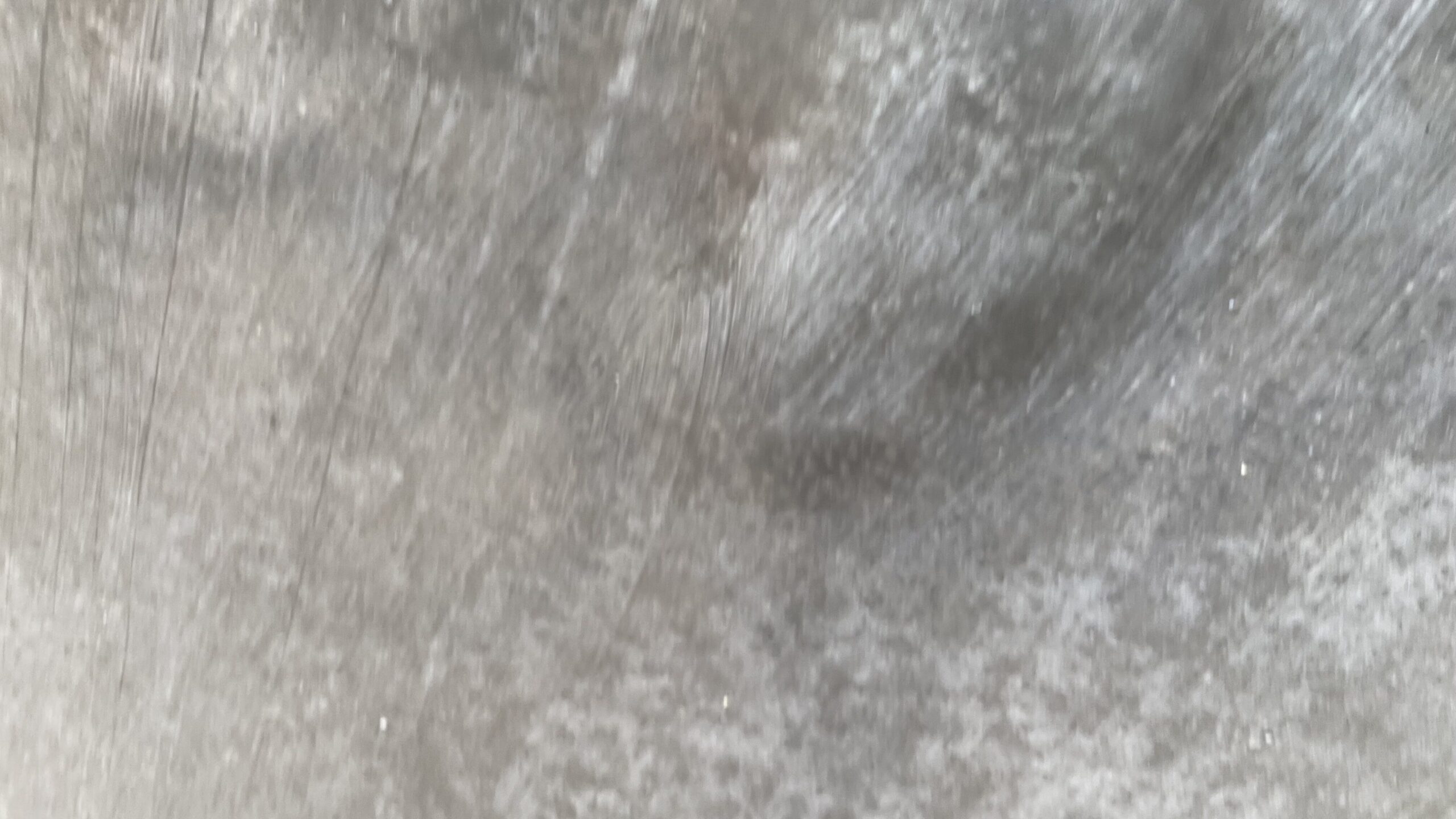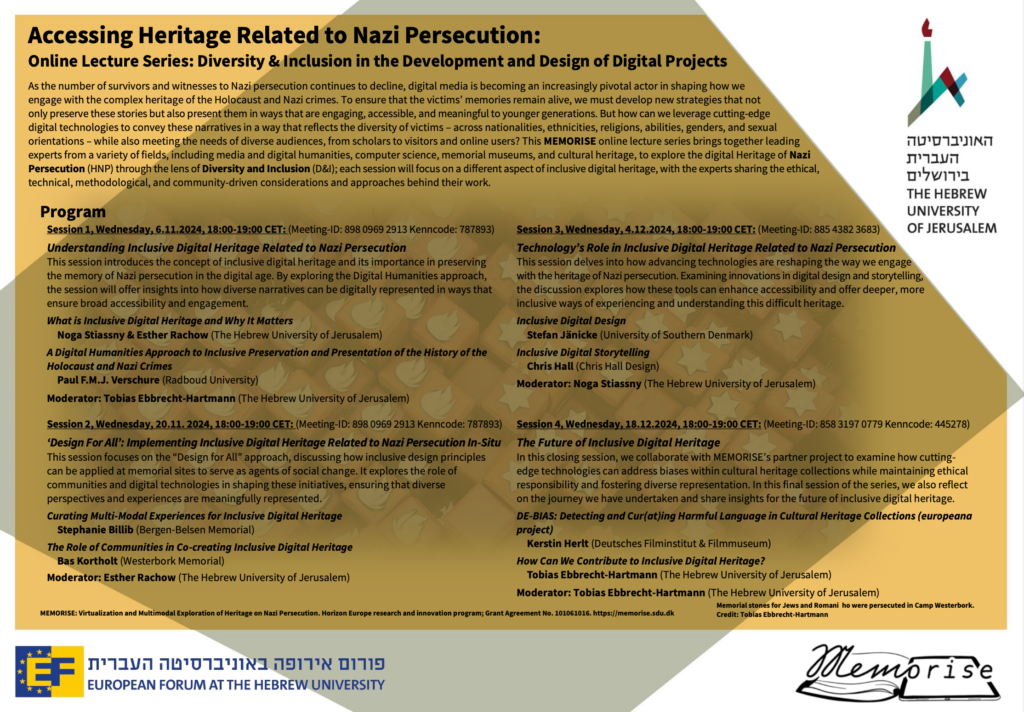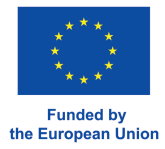Diversity & Inclusion in the Development and Design of Digital Projects
As the number of survivors and witnesses to Nazi persecution continues to decline, digital media is becoming an increasingly pivotal actor in shaping how we engage with the complex heritage of the Holocaust and Nazi crimes. To ensure that the victims’ memories remain alive, we must develop new strategies that not only preserve these stories but also present them in ways that are engaging, accessible, and meaningful to younger generations. But how can we leverage cutting-edge digital technologies to convey these narratives in a way that reflects the diversity of victims – across nationalities, ethnicities, religions, abilities, genders, and sexual orientations – while also meeting the needs of diverse audiences, from scholars to visitors and online users? This online lecture series brings together leading experts from a variety of fields, including media and digital humanities, computer science, memorial museums, and cultural heritage, to explore the digital Heritage of Nazi Persecution (HNP) through the lens of Diversity and Inclusion (D&I); each session will focus on a different aspect of inclusive digital heritage, with the experts sharing the ethical, technical, methodological, and community-driven considerations and approaches behind their work.

Program
Click here to join: Session 1, Wednesday, 6.11.2024, 18:00-19:00 CET:
Understanding Inclusive Digital Heritage Related to Nazi Persecution
This session introduces the concept of inclusive digital heritage and its importance in preserving the memory of Nazi persecution in the digital age. By exploring the Digital Humanities approach, the session will offer insights into how diverse narratives can be digitally represented in ways that ensure broad accessibility and engagement.
Noga Stiassny & Esther Rachow (The Hebrew University of Jerusalem) What is Inclusive Digital Heritage and Why It Matters
Paul F.M.J. Verschure(Radboud University) A Digital Humanities Approach to Inclusive Preservation and Presentation of the History of the Holocaust and Nazi Crimes
Moderator: Tobias Ebbrecht-Hartmann (The Hebrew University of Jerusalem)
Click here to join: Session 2, Wednesday, 20.11. 2024, 18:00-19:00 CET:
‘Design For All’: Implementing Inclusive Digital Heritage Related to Nazi Persecution
This session focuses on the “Design for All” approach, discussing how inclusive design principles can be applied at memorial sites to serve as agents of social change. It explores the role of communities and digital technologies in shaping these initiatives, ensuring that diverse perspectives and experiences are meaningfully represented.
Stephanie Billib (Bergen-Belsen Memorial) Curating Multi-Modal Experiences for Inclusive Digital Heritage
Bas Kortholt (Westerbork Memorial) The Role of Communities in Co-creating Inclusive Digital Heritage
Moderator: Esther Rachow (The Hebrew University of Jerusalem)
Click here to join: Session 3, Wednesday, 4.12.2024, 18:00-19:00 CET:
Technology’s Role in Inclusive Digital Heritage Related to Nazi Persecution
This session delves into how advancing technologies are reshaping the way we engage with the heritage of Nazi persecution. Examining innovations in digital design and storytelling, the discussion explores how these tools can enhance accessibility and offer deeper, more inclusive ways of experiencing and understanding this difficult heritage.
Stefan Jänicke (University of Southern Denmark) Inclusive Digital Design
Chris Hall (Chris Hall Design) Inclusive Digital Storytelling
Moderator: Tobias Ebbrecht-Hartmann (The Hebrew University of Jerusalem)
Click here to join: Session 4, Wednesday, 18.12.2024, 18:00-19:00 CET:
The Future of Inclusive Digital Heritage
In this closing session, we collaborate with MEMORISE’s partner project to examine how cutting-edge technologies can address biases within cultural heritage collections while maintaining ethical responsibility and fostering diverse representation. In this final session of the series, we also reflect on the journey we have undertaken and share insights for the future of inclusive digital heritage.
Kerstin Herlt (Deutsches Filminstitut & Filmmuseum) DE-BIAS: Detecting and Cur(at)ing Harmful Language in Cultural Heritage Collections
Tobias Ebbrecht-Hartmann (The Hebrew University of Jerusalem) How Can We Contribute to Inclusive Digital Heritage?
Moderator: Noga Stiassny (The Hebrew University of Jerusalem)
As an international and interdisciplinary research project, MEMORISE is committed to creating an inclusive digital environment in which the tangible and intangible Heritage related to Nazi Persecution (HNP) is universally accessible as part of a shared and multi-layered heritage. We acknowledge the dual nature of digital technology: its immense potential to facilitate new avenues for engagement with, and exploration of, HNP through the lens of Diversity & Inclusion, as well as the new ethical challenges it presents. Our approach is therefore informed by the principle of ‘design for all’ which we apply to the digital realm in order to enhance digital literacy and empower users to actively engage with historical and heritage narratives of Nazi persecution in ways that highlight the transnational and cross-generational dimension of HNP. Guided by the ‘design for all’ principle, our digital applications address the varied needs of diverse users across ages and locations, and cover a comprehensive array of conceptual, methodological, and curatorial strategies. Their user-centric intuitive design consciously avoids the over-categorization of victims and counters discriminatory racial divisions, offering accessible language, multilingual options, and providing multiple points of contact with HNP that resonate with the experiences of individuals and groups from the past and in today’s world. We view the development of a diversity and inclusion-driven digital environment as an ongoing journey. We remain dedicated to continual learning, adaptation, feedback, and further exploration in our endeavor to establish a truly welcoming digital culture.
Organizational Team: Tobias Ebbrecht-Hartman, Noga Stiassny, Esther Rachow
In coorperation with the European Forum at the Hebrew University of Jerusalem





No responses yet